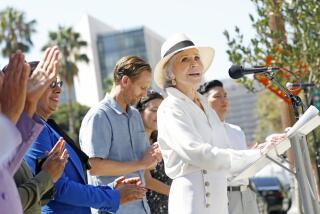Hanoi Must Change Its Act
In the Socialist Republic of Vietnam there is an “official” history in which the soldiers of the Viet Cong and North Vietnamese armies were all heroic, and every American they fought a contemptible imperialist. Bureaucrats at the National Film Censorship Council there read scripts in advance to gauge their historic legitimacy, and when these critics give a movie a thumbs down, it’s not about box office--the film doesn’t get made. Now two movies created in the nation of contemptible imperialism have come back to haunt a Vietnamese actor in his noble native land.
In “We Were Soldiers,” Don Duong portrays a courageous commander in the Vietnamese army who fights equally courageous American soldiers, including one played by Mel Gibson. In “Green Dragon,” Duong is a Vietnamese man who, having left a refugee camp at Camp Pendleton, returns to tell other refugees not to fear life in America. Both films offend Vietnam’s institutionalized political correctness.
Duong, who lives in Ho Chi Minh City, had traveled with relative freedom before his government saw the movies and labeled him “an instrument in the hands of forces hostile to the Vietnamese nation.” Now Vietnam has forbidden him to attend a film festival. It may bar the “national traitor” from acting and forbid him to leave the country for five years.
Such attitudes toward artistic license are standard in totalitarian states. Joseph Stalin worked hard to make sure people saw only what was good for them. Cuba, China and any number of Arab nations are similarly concerned about protecting people from dangerous views of history and unsanctioned ideas.
In the United States, however, filmmakers remain free to make movies no matter how loudly Al Sharpton carps about a character’s historical irreverence. And no one would dare suggest, even in wartime, that certain views are unpatriotic and ought to be suppressed. (Right?) That’s why it’s appropriate that the State Department has joined Duong’s relatives in the U.S. and a slew of Hollywood types in asking Vietnam to stop persecuting the actor. It should keep up the pressure.
Vietnam says it is ready to throw open its economy to global trade and establish normal diplomatic relations with the world’s democracies. But the nation’s fear of free expression tells a different story--one that history will not view kindly, no matter how many times it is officially sanitized.
More to Read
Only good movies
Get the Indie Focus newsletter, Mark Olsen's weekly guide to the world of cinema.
You may occasionally receive promotional content from the Los Angeles Times.










